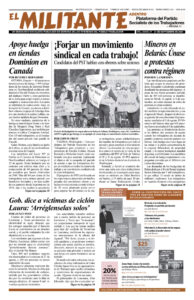September 25, 1995
Brutal police attacks against Native rights protesters in Ontario and British Columbia have left one person dead and at least four more injured by cop bullets. The standoff by Native people against the Royal Canadian Mounted Police is about unsettled native land claims.
This summer Native people have erected barricades and occupied land at seven different points across the country. The federal and provincial governments along with the cops are waging a racist campaign to paint the Native fighters as outlaws and criminals.
The land claims of Native people across the country should be recognized and settled without further delay. In the context of the deepening political and economic crisis facing Canada’s capitalist rulers the state force used against Native people today will be turned against strikers on picket lines tomorrow.
September 25, 1970
On Sept. 14, the second largest union in the United States struck General Motors, the world’s largest manufacturer, bringing to a head two months of fruitless contract negotiations between the 1.4-million member United Auto Workers and the “Big-3” auto producers — Ford, Chrysler and GM.
The strike brought into sharp focus the refusal of American industrial workers to pay for the government’s despised war in Vietnam through inflation and “restraint” in wage demands. One of the issues is the UAW’s demand for the restoration of guaranteed periodic wage increases tied to the cost-of-living index.
The strike reflected the growing rebelliousness of the new generation of young workers, both Black and white, who are less and less willing to sell their souls and bodies into a lifetime of slavery to the all-devouring assembly line.
September 22, 1945
Many Koreans hoped that victory of the Allies over Japan would mean the independence of Korea. These hopes are turning into bitter disillusionment.
The armies of American imperialism are rolling into South Korea, and where they do not set up direct military control, they are bolstering the imperialist Japanese officialdom. One of the first orders of the occupying forces was that Japanese administrative officials would remain in office.
Demonstrations broke out in Seoul. General MacArthur answered with a proclamation that any act to disturb the peace or any hostilities against Allied troops would be punishable by death or such other punishment as the occupation authorities decided to inflict. General Hodge, in charge of the occupation, told the Koreans that their desire for immediate independence cannot be granted.

